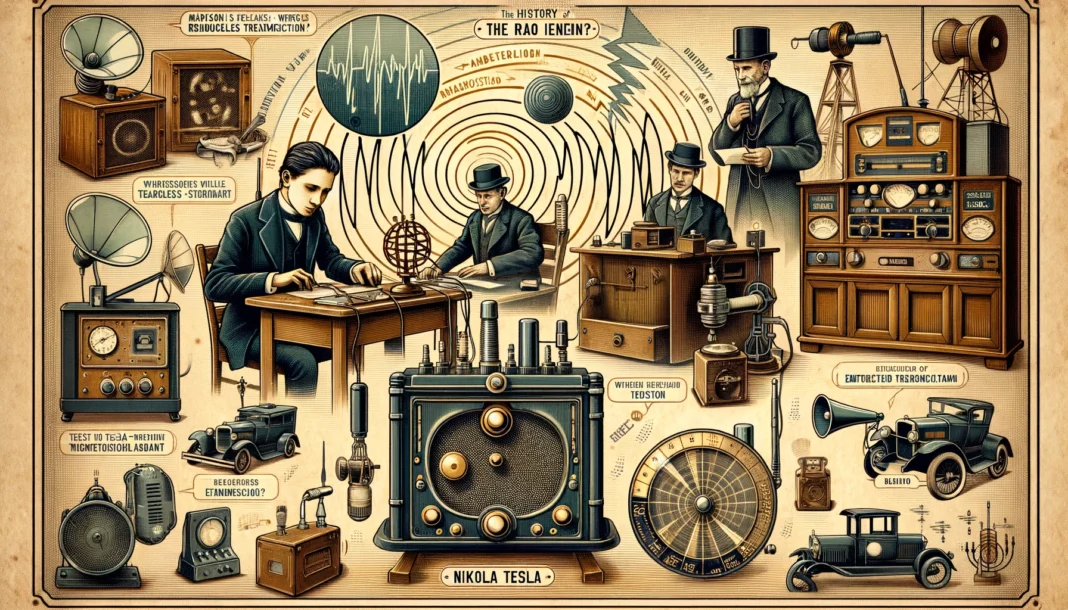When was the radio invented, and why is consulting crucial in the process of technological innovation? These questions are essential to understanding the history and evolution of one of the most transformative inventions of the 20th century. In this article, we will examine the origins of the radio, the key figures involved, and the importance of consulting in bringing such innovations to life.
What Sparked the Idea of the Radio?
The journey to inventing the radio began in the 19th century with the exploration of electromagnetic waves. Scientists like James Clerk Maxwell and Heinrich Hertz laid the groundwork for wireless communication. Maxwell’s theoretical work on electromagnetic fields and Hertz’s experiments proving the existence of these waves were crucial steps toward the development of radio technology.
Key Figures in Early Radio Development
- James Clerk Maxwell: His equations predicted the existence of electromagnetic waves.
- Heinrich Hertz: Conducted experiments that confirmed Maxwell’s theories.
- Nikola Tesla: Made significant contributions to the development of radio transmission.
- Guglielmo Marconi: Often credited with inventing the radio, Marconi made the first successful transatlantic radio transmission.
Why Was Consulting Important in the Radio’s Invention?
Consulting played a significant role in the development of the radio. Inventors and scientists often needed advice and collaboration from experts in various fields. For instance, Marconi consulted with engineers, financial backers, and other scientists to refine his inventions and make them commercially viable. The question “Why consulting?” becomes clear when we look at the collaborative efforts required to turn theoretical ideas into practical technologies. Also read Consulting: Impact and Benefits for Modern Business
The Role of Consulting in Marconi’s Success
- Technical Expertise: Marconi worked with engineers to improve his equipment.
- Financial Support: He sought advice from financiers to fund his experiments and commercial ventures.
- Patent Advice: Consulting with legal experts helped Marconi secure patents, protecting his inventions.
Who Were the Pioneers Behind the Radio?
Several pioneers contributed to the invention and development of the radio. Understanding their roles helps us appreciate the collaborative nature of technological innovation.
Nikola Tesla
Tesla’s work on alternating current (AC) and wireless transmission of electricity laid the foundation for many radio technologies. Although he is often overshadowed by Marconi in the context of radio, Tesla’s contributions were crucial.
Guglielmo Marconi
Marconi is widely credited with the invention of the radio due to his successful demonstrations of wireless communication. His ability to secure patents and commercialize his technology was instrumental in the widespread adoption of radio.
Reginald Fessenden
Fessenden made significant advances in radio technology, including the first transmission of voice and music over radio waves. His work expanded the possibilities of what radio could achieve.
What Were the Key Milestones in Radio Development?
The development of radio technology was marked by several key milestones. These achievements highlight the incremental progress made through research, experimentation, and consulting.
Early Experiments and Theoretical Work
- Maxwell’s Equations (1864): Predicted the existence of electromagnetic waves.
- Hertz’s Experiments (1886-1888): Demonstrated the reality of electromagnetic waves.
Practical Applications and Innovations
- Tesla’s Wireless Transmission (1893): Demonstrated the possibility of transmitting signals wirelessly.
- Marconi’s First Transatlantic Transmission (1901): Proved that radio waves could travel long distances.
Commercialization and Public Broadcasting
- First Radio Broadcast (1906): Fessenden’s transmission of voice and music.
- Establishment of Radio Stations (1920s): The rise of commercial radio broadcasting.
Why Did Radio Become So Popular?
The radio quickly became a popular medium for communication and entertainment. Its ability to transmit information over long distances without the need for physical connections made it revolutionary.
Factors Contributing to Radio’s Popularity
- Accessibility: Radio receivers became more affordable and widespread.
- Variety of Content: Radio offered news, music, drama, and educational programs.
- Real-Time Communication: It allows people to receive information instantaneously.
The Impact of Radio on Society
- Cultural Influence: Radio shaped public opinion and culture.
- Emergency Communication: It became a vital tool for emergency broadcasts and public safety.
- Global Connectivity: Radio connected people across vast distances, fostering a sense of global community.
How Did Consulting Shape the Evolution of Radio?
Consulting continued to play a vital role as radio technology evolved. Engineers, broadcasters, and policymakers collaborated to improve and regulate the industry.
Technical Advancements Through Consulting
- Signal Clarity: Engineers worked together to reduce static and improve sound quality.
- Frequency Regulation: Policymakers and engineers developed standards to manage the radio spectrum.
Economic and Legal Consulting
- Business Models: Consultants helped radio stations develop sustainable business models through advertising and sponsorship.
- Legal Frameworks: Legal experts worked on regulations to manage the growing industry and protect intellectual property.
Does Consulting Still Matter in Modern Radio?
In the modern era, consulting remains essential in the radio industry. With the advent of digital radio and internet broadcasting, new challenges and opportunities arise.
Modern Challenges and Consulting Solutions
- Digital Transition: Consultants assist with the shift from analog to digital broadcasting.
- Content Creation: Experts provide insights on producing engaging content for diverse audiences.
- Monetization Strategies: Consultants help broadcasters find new revenue streams in a competitive market.
The Future of Radio and Consulting
- Technological Innovation: Ongoing consulting is crucial for integrating emerging technologies like artificial intelligence and virtual reality into radio.
- Regulatory Compliance: As regulations evolve, legal consulting ensures that broadcasters remain compliant.
Conclusion
The invention of the radio was a complex process that involved many pioneers and significant consulting efforts. From the early theoretical work of Maxwell and Hertz to Marconi’s practical applications and Fessenden’s innovations, the development of radio was marked by collaboration and expertise. Consulting played a crucial role in overcoming technical, financial, and legal challenges, highlighting the importance of seeking expert advice in technological innovation. As radio continues to evolve in the digital age, consulting remains as relevant as ever, ensuring that this transformative medium adapts to new technologies and market dynamics.



